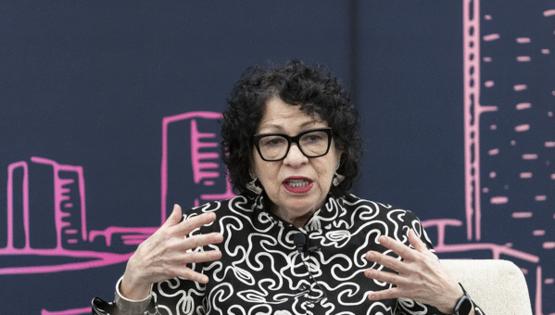Justice Sotomayor brings her Latin roots to Miami, and has a message for young people
Published in Political News
MIAMI —Sonia Sotomayor may be a household name, but her storied legal career stems largely from feeling comfortable in her own skin.
“You have to be true to yourself,” Sotomayor, the nation’s first Hispanic justice on the U.S. Supreme Court, told more than 200 people Tuesday evening during a chat with Knight Foundation President and CEO Maribel Pérez Wadsworth at the Miami Dade College campus in Little Havana.
“I have never denied my culture or hidden my love for my Spanish roots,” Sotomayor said, highlighting her love for family, salsa and roasted pork. “All of these things are important to me and I take pride in them.”
From the Bronx to Supreme Court bench
Raised in a Bronx housing project by Puerto Rican parents, Sotomayor graduated from Ivy League universities before launching her legal career as a state prosecutor in Manhattan, then serving two swings as a federal judge, and capping it off with a seat on the U.S. Supreme Court.
Sotomayor, 70, brought her grounded perspectives on her life and the law to the Miami audience, focusing on her goal of uplifting young students who will shape the course of society.
“My decision was talking to young people, trying to inspire them, to understand the power they have, because I didn’t know when I was growing up that I had any power,” she said.
Sotomayor, author of a memoir, “My Beloved World,” on the early stages of her life, was diagnosed with juvenile diabetes at age 8 and credits living with the chronic illness with teaching her discipline. Sotomayor, whose father died when she was 9, also credits the lessons she learned from the fictional tales of a young girl detective, Nancy Drew, as one of the motivations for her career.
Her first job out of Yale Law School was as a prosecutor with the Manhattan district attorney’s office — a different path from many of her classmates who sought high-paying jobs with white-shoe law firms.
“I threw away my playbook and I took a chance, and I turned out to be pretty good at it,” said Sotomayor, who went on to be appointed as a federal judge by President George H. W. Bush in 1992 and a federal appellate judge by President Bill Clinton six year later.
Her life would change forever when President Barack Obama appointed her to the Supreme Court in 2009.
Sotomayor has spent most of her career in a minority role, particularly on the Supreme Court, which has evolved into a conservative super-majority during the era of President Donald Trump.
Wrote dissent on Trump immunity case
Never was this more obvious than when Sotomayor wrote the dissent for the three Democratic appointees when the Supreme Court voted 6-3 in ruling that a president has general immunity, breaking with legal precedents.
The six Republican appointees ruled that the president has “presumptive” immunity from criminal liability for his official acts and absolute immunity for some “core” acts — including Trump’s attempts to use the Justice Department to obstruct the results of the 2020 election, which Trump lost to Joe Biden.
Sotomayor, who was joined by Justices Elena Kagan and Ketanji Brown Jackson, declared that their conservative colleagues had made the president into “a king above the law.”
Writing that the majority was “deeply wrong,” Sotomayor added it would have “stark” long-term consequences for the future of American democracy.
On Tuesday evening, the Knight Foundation’s president, Perez Wadsworth, refrained from asking Sotomayor about any particular Supreme Court decisions.
However, she asked Sotomayor about how the nine-member court interacts and makes decisions.
“The first and most important part is listening,” she said.
“People you disagree with are not bad people,” she said. “My colleagues, whom I disagree with frequently, are not bad people.”
“Most people believe that law is black and white and they don’t understand why we disagree,” she added. “But law is not black and white, it’s gray.”
Not ‘a monarchy’
Sotomayor was also asked about the checks and balances that underscore the U.S. Constitution. She said the founding fathers created a republic based on the rule of law, with co-equal branches in the presidency, Congress and the Supreme Court
“Our founders were hellbent that we didn’t have a monarchy,” she said, noting, “They gave the courts the power to interpret the law.”
Sotomayor touched on the First Amendment, which protects freedom of speech and the press, saying that “many have called the press the fourth branch of the government.”
She also recognized the huge impact of social media on the news and the public’s consumption of information. “The Internet is creating an extraordinary challenge to the press and the world,” she said, largely because it produces so much misinformation and is unregulated.
But her most enduring message was for the young students in the audience, imparting lessons about education, inspiration and passion.
“We adults have messed up the world for you,” Sotomayor said, citing a litany of problems, from endless wars to economic disparity. “I want you to believe in your power to make the world a better place.”
©2025 Miami Herald. Visit at miamiherald.com. Distributed by Tribune Content Agency, LLC.



































































Comments